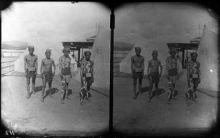Article
This Zuni term refers to a group of men chosen by the tribe to perform as runners of the sacred dance in public ceremonials. Zuni communal rituals are closely aligned with the seasonal cycle of planting, growing, and harvesting grain, especially corn, and these agile runners' task is to carry pouches of grain between certain locations in or around the village, creating a symbolic connection between the people of the village and the spirits and gods that surround them. Zuni sacred gatherings involve interrelated societies that are dedicated to a particular group of spirits, each with its own system of priesthood, codes of conduct, and a unique tradition of worship and rituals. The purpose of these societies' activities and celebrations is to promote harmony with the forces of nature and ensure health, fertility, and abundance of corn and other crops and sources of food.
"Zuni Runners at Tertio Millenial Exposition, Santa Fe, 1882," photograph (016234)Palace of the Governors Photo Archive, Ben Wittick Collection Center for Southwest Research, University Libraries, University of New Mexico
Manuscripts
References
Cushing, Frank Hamilton
1974 Indian Notes and Monographs: Zuni Breadstuff. New York: Museum of the American
Indian.
Hirschfelder, Arlene, and Paulette Molin
2000 "Zuni ceremonialism." Encyclopedia of Native American Religions, Updated Edition.
New York:Facts On File, Inc. American Indian History Online. Facts On File, Inc.
http://www.fofweb.com/activelink2.asp?ItemID=WE43&iPin=ind2304&SingleRe…,
accessed November 25, 2014.

